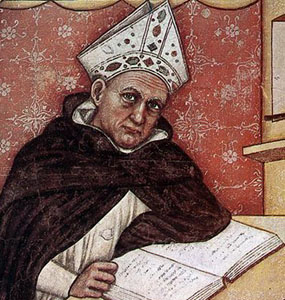Albertus Magnus (nonfiction): Difference between revisions
Jump to navigation
Jump to search
No edit summary |
No edit summary |
||
| Line 1: | Line 1: | ||
[[File:Albertus_Magnus.jpg|thumb|]]''Albertus Magnus'', O.P. (c. 1200 – November 15, 1280), also known as Saint Albert the Great and Albert of Cologne, was a German Dominican friar and Catholic bishop. | [[File:Albertus_Magnus.jpg|thumb|Albertus Magnus.|]]''Albertus Magnus'', O.P. (c. 1200 – November 15, 1280), also known as Saint Albert the Great and Albert of Cologne, was a German Dominican friar and Catholic bishop. | ||
Later canonized as a Catholic saint, he was known during his lifetime as ''doctor universalis'' and ''doctor expertus'' and, late in his life, the term magnus was appended to his name. | Later canonized as a Catholic saint, he was known during his lifetime as ''doctor universalis'' and ''doctor expertus'' and, late in his life, the term magnus was appended to his name. | ||
Revision as of 17:30, 19 April 2017
Albertus Magnus, O.P. (c. 1200 – November 15, 1280), also known as Saint Albert the Great and Albert of Cologne, was a German Dominican friar and Catholic bishop.
Later canonized as a Catholic saint, he was known during his lifetime as doctor universalis and doctor expertus and, late in his life, the term magnus was appended to his name.
The Catholic Church distinguishes him as one of the 36 Doctors of the Church.
Scholars such as James A. Weisheipl and Joachim R. Söder have referred to him as the greatest German philosopher and theologian of the Middle Ages. For Erdmann he is definitely greater and more original than his pupil Aquinas.
In the News
Fiction cross-reference
Nonfiction cross-reference
External links:
- Albertus Magnus @ Wikipedia
